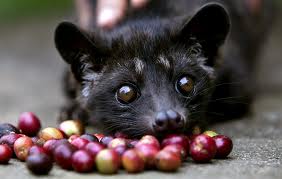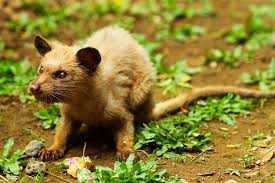“Behind the world’s most expensive coffee are huge animal welfare issues”, says the World Society for the Protection of Animals*, and consumers, retailers and governments need to help end the cruel practices behind civet coffee production.
A BBC report on this issue, launched today, features WSPA wildlife experts highlighting animal welfare concerns related to civet coffee, and now has retailers questioning whether or not they should continue to sell this luxury product.
Selling for up to $100 USD per cup, civet coffee, or ‘Kopi Luwak’ as it is known in Indonesia is made from coffee beans that the small cat-like mammal, known as a civet partially digests and excretes. The digestive process is believed to ferment the beans and produce a coveted smooth taste according to coffee aficionados.
Whilst some beans are still sourced harmlessly and traditionally by local people gathering civet droppings in the wild—a method believed to produce the most superior tasting civet coffee—disturbing evidence presented to WSPA by the BBC shows that civets are increasingly caged in cruel and inadequate conditions in South East Asia to increase the yield of beans for this rare and highly coveted drink.
The evidence WSPA has been presented shows large numbers of civets demonstrating signs of great stress and suffering. Confined to typically tiny, barren cages with nothing to sleep or hide in, their basic needs are completely neglected.
 Unable to cope with the frustration, fear and stress of living in such unsuitable conditions, they demonstrate abnormal and often harmful behaviours such as pacing and self-mutilating. The civets are captured from the wild using cruel methods and often suffer from injuries, infections, disease and premature death. They are fed a restricted diet of coffee cherries to meet the growing global demand for this luxury product.
Unable to cope with the frustration, fear and stress of living in such unsuitable conditions, they demonstrate abnormal and often harmful behaviours such as pacing and self-mutilating. The civets are captured from the wild using cruel methods and often suffer from injuries, infections, disease and premature death. They are fed a restricted diet of coffee cherries to meet the growing global demand for this luxury product.
There are also conservation concerns for civets, resulting from the removal of these wild animals from their natural habitats. A variety of different civet species are used to produce civet coffee including the Binturong which is classified as ‘vulnerable’ by the International Union for Conservation of Nature’s red list, and its removal from the wild puts the whole species at even greater risk.
Other species such as the Asian palm civet are more widespread, but as there is no specific data on their numbers, farmed civet coffee production may already be contributing to the extinction of local populations.
For many consumers wanting to source cage-free civet coffee it can be difficult, as some producers are known to mix caged civet coffee beans with the humane cage-free stock before selling it on.
WSPA believes that the products reaching the shelves do not consider the animal welfare concerns and are not adequately labelled to support both responsible retailers and consumers in their quest for animal-friendly products.
WSPA Wildlife campaign leader, Dr Neil D’Cruze says:
“The footage we have seen of these caged civet farms is shocking. These animals belong in the wild and should not be needlessly captured and caged.
“Choosing cage-free civet coffee is better for the civets, better for conservation, better for coffee connoisseurs and better for rural communities, who can still continue to generate a small income by collecting and selling the partially digested beans.
“Consumers, retailers and the governments of producing countries need to join with WSPA to help prevent this cruel practice. It is needless and inhumane and together we can put that right.”
 What is WSPA (http://www.wspa-international.org/) calling for?
What is WSPA (http://www.wspa-international.org/) calling for?
Check out the cage-free chain
Retailers to pledge to only source ‘cage free’ civet coffee and remove inhumane products from their shelves. Retailers believing their civet coffee already comes from wild, ‘cage-free’ sources are urged to scrutinise their supply chains and obtain proof that this is the case.
Certification of wild sourcing
WSPA would like to see the introduction of an accredited certification scheme as standard for humane ‘cage-free’ civet coffee. We are urging retailers to lend their support and engage with certification bodies as well their suppliers to push for the development and enforcement of a humane chain.
Improved government oversight and enforcement
The governments of civet coffee producing countries can support cage-free production initiatives that protect civet welfare, the future of the species and the livelihoods and well-being of local communities.










